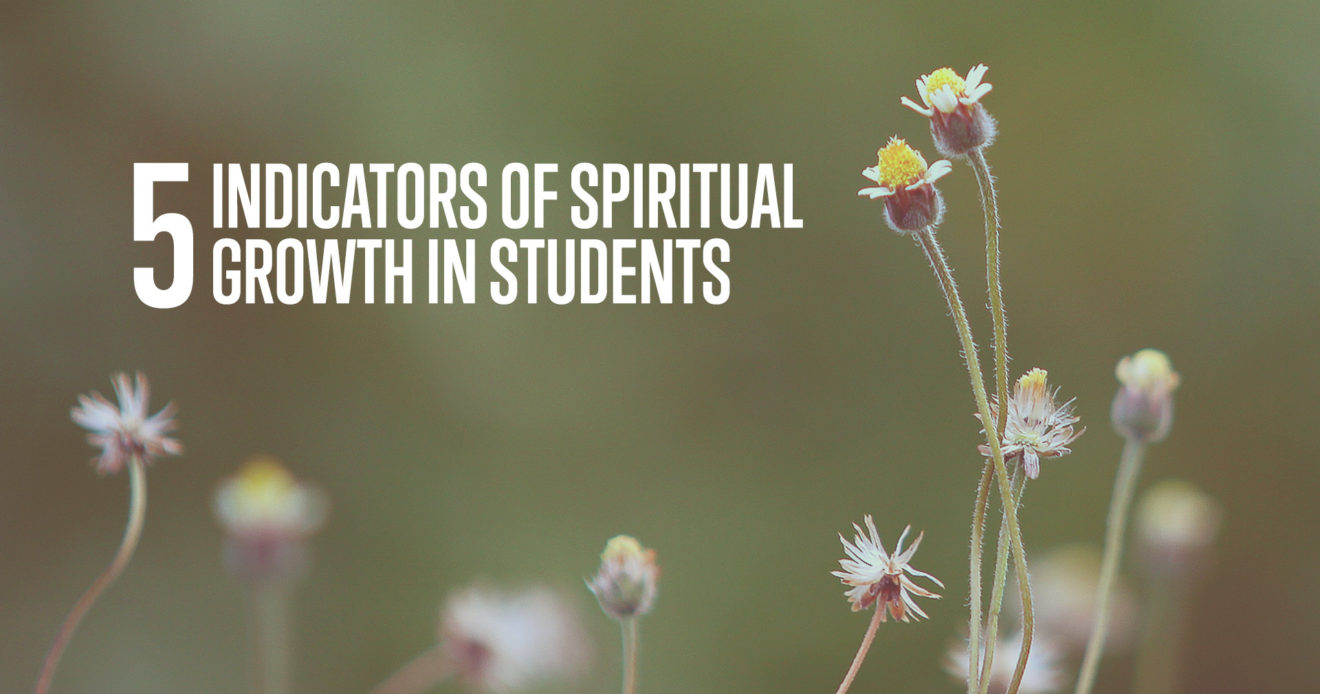
5 Indicators of Spiritual Growth in Students
We all want to make disciples, but how can we measure success and failure?
You know the student. She reads her Bible daily. She does a devotional every morning. She is always telling people she is praying for them. She respects her parents and other adults. She is an excellent student. She even carries around a journal filled with verses, prayers, and thoughts and insights from past sermons. Clearly, this student is a growing disciple. Right?
Are you sure? How do you know? Is there something quantifiable that we can look at to make such an assessment?
As a veteran teacher, it becomes a part of everyday life to think in terms of assessment. But as a Bible teacher, I always struggled with the balance of assessing biblical knowledge with spiritual growth. The problem is, is that spiritual growth cannot be evaluated in terms of Bible study time, prayers, journals, quality of worship, church attendance, etc. All of these things are good. And yes there is a difference between the one who never reads her Bible or participates in worship versus the one who is actively engrossed in her Bible and passionately worships at each opportunity. But even the one who worships with intensity and passion could be living a life of sin and ultimately be spiritually dead. And the one who seems to be the Bible know-it-all might not know Jesus.
So as important as these things are, they don’t supply us with enough information to assess if our efforts as youth leaders are actually producing disciples. But don’t worry, there is hope. Although it might seem easier to look to performance and process to help us determine a level of spiritual maturity in our students, we all know deep down that spiritual growth is not at all quantifiable. We can’t assign a grade to our students at the end of the school year. We don’t give final exams in, “How Much They Love Jesus 101.” But there are some indicators (if you pay attention) or questions you can ask yourself about your students that will help you pastor them and deepen their walk with Christ.
Are they honest with themselves?
The apostle Paul was incredibly self-aware. A brilliant man. He was passionate, zealous, even at times a little. But he knew the depth and breadth of his sin and therefore knew the depth and breadth of God’s grace extended to him through Christ. A former colleague of mine used to tell students that they were both divine and disgusting. It was sort of his own way of reminding them, to be honest about who they are as a sinner, but also who they belong to as one saved by grace. The deeper we are in a relationship with Christ, the more self-aware we are of our own sin, the more appreciative we are of grace, and therefore the more determined we are to live righteously.
Are they finding new sins?
I know that sounds weird. Let me explain. As students come to know Jesus they are confronted with the gravity of their sin. They feel the need to stop doing something or start doing something else. As youth leaders, we work with them, pray with them, hold them accountable, and continually encourage them. And with enough time, effort, and a whole lot of prayer, we no doubt, have seen students transformed. But is that it? Conquer a few big sins, and we are good enough. Believe it or not, many of our students are content with steering clear of the "big" sins and declaring themselves safe. But Paul told the Roman church to be transformed by the renewing of their minds (Romans 12:2). The assumption for Paul and the Romans was that this was a continual process until we are perfect, imitators of God (Matthew 5:46, Eph. 5:1). It is great to see our students conquer sin. Celebrate with them. But then get them moving on to a new sin to overcome.
Are they investing in others?
There was a young man on a retreat with his youth group. The final service was powerful and life-changing for many. Even as the last service ended, students continued to seek out other students to pray, reconcile, and encourage one another. Except for this one young man. He sat, huddled in the middle of the room. His face covered in tears. The youth pastor approached him to ask if he was alright. The student expressed his anger that all of these other students had approached one another and prayed for each other, yet no one approached him. The youth pastor looked at this young man and asked, “who have you prayed for, reconciled with, or encouraged?”
This young man had waited for someone to come to him and spent no time approaching others. A friend of mine used to call this being a “here I am person,” rather than a “there you are person.” Spiritual growth is about becoming a “there you are person.”
Are they gaining a deeper understanding of who God is?
We are commanded to love God with all of our heart, soul, strength, and mind. So much of western Christianity focuses on the emotional side of faith that we forget and neglect the importance of study. As a youth leader, ask yourself if you are taking your students deep enough, challenging them intellectually, and encouraging the more in-depth discussions. When you consider your student's spiritual growth how much they know about God is tied to how deeply they are capable of loving him. Imagine if after of twelve years of marriage I never bothered to really know much about my wife. What would our marriage look like? There would be little depth, no fulfillment, and maybe no reason to really be married in the first place. But just like in any relationship depth and meaning come from an intentional pursuit of that person. Our relationship with Christ is no different.
Do their actions reflect a missional attitude?
Jesus said to his disciples, “just as the Father has sent me, so I send you” (John 20:21). Paul and Peter remind us in their letters that we are a people on mission for the gospel. When faced with persecution and possible death from speaking about Jesus, Peter told the Jewish authorities that there is nothing else he can speak about (Acts 4:20). When we consider the lives of those in the first-century church, it is easy to see that our faith in Christ is certainly personal, but it is not private. Students who are working and growing in their relationship with Christ live out loud. They are not ashamed of the gospel. They understand that their choices are often countercultural. Living with a privatized faith confined to church buildings and bedroom walls reveals an incredible opportunity for you as a leader to help that student mature in their faith.
We are not asking students to be perfect. We are not telling them that salvation is contingent on what kind of person they are. What we are telling them is that discipleship is about being a student. It is about being a student who desires to be like his teacher. The life of a disciple of Christ is a lifelong pursuit of becoming more and more like Christ so that Christ may be made known to the world. There are ups and downs; times you feel great moments of growth and other times stagnant. But as you walk alongside your students these simple indicators can help you take advantage of learning moments, celebrate successes, and dust off after failures. Increase the impact of your ministry by asking these questions about your students, and you will see the spiritual growth in your students come alive in ways you had not expected.
Steve Kozak
Executive Director of AwanaYM
Steve currently serves as the Executive Director of AwanaYM. Previously, Steve spent over a decade teaching high school theology and apologetics from Detroit to LA. Steve holds a Masters degree in Theology from Moody Theological Seminary and a Masters in Christian Apologetics from Biola University. Steve is also an adjunct professor at Trinity International University. He speaks and writes on youth ministry, youth culture and apologetics. He resides in Chicago, IL with his wife and four children.FollowSteve Kozak on Twitter: stevenmkozak
Comments
Get the AwanaYM Update
Receive youth ministry resources in your inbox. Subscribe today!
